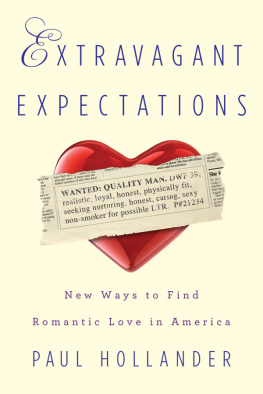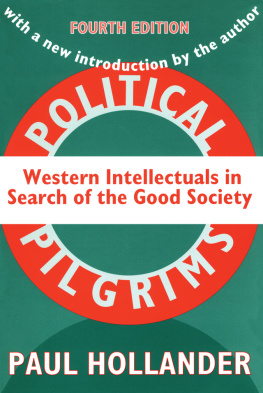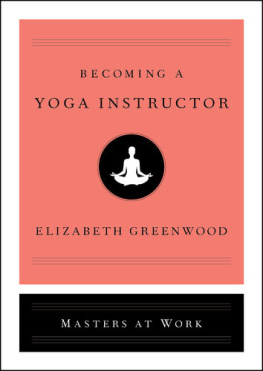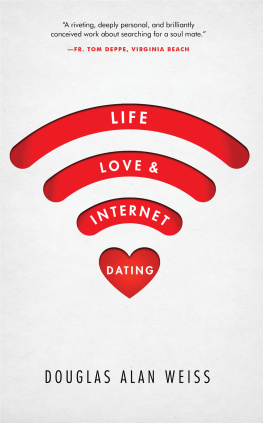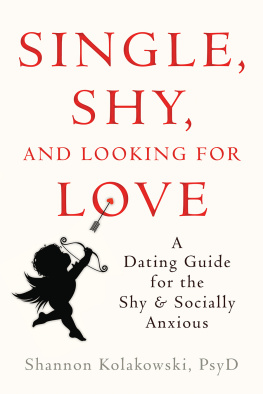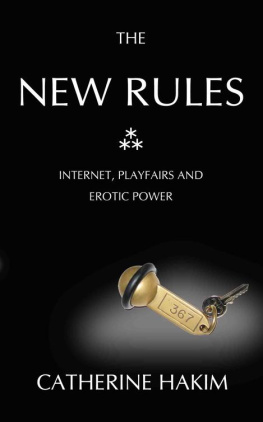Extravagant Expectations
BOOKS BY PAUL HOLLANDER
The Only Super Power
Political Violence (editor)
The End of Commitment
From the Gulag to the Killing Fields (editor)
Understanding Anti-Americanism (editor)
Discontents: Postmodern and Postcommunist
Political Will and Personal Belief
Anti-Americanism
Decline and Discontent
The Survival of the Adversary Culture
The Many Faces of Socialism
Political Pilgrims
Soviet and American Society
American and Soviet Society (editor)
Extravagant Expectations
New Ways to Find Romantic Love in America
Paul Hollander
IVAN R. DEE
Chicago
Published by Ivan R. Dee
A wholly owned subsidiary of The Rowman & Littlefield Publishing Group, Inc.
4501 Forbes Boulevard, Suite 200, Lanham, Maryland 20706
http://www.rowmanlittlefield.com
Estover Road, Plymouth PL6 7PY, United Kingdom
Distributed by National Book Network
EXTRAVAGANT EXPECTATIONS. Copyright 2011 by Paul Hollander
All rights reserved, including the right to reproduce this book or portions thereof in any form. For information, address: Ivan R. Dee, Publisher, 1332 North Halsted Street, Chicago 60642, a member of the Rowman & Littlefield Publishing Group.
Manufactured in the United States of America and printed on acid-free paper.
www.ivanrdee.com
Library of Congress Cataloging-in-Publication Data:
Hollander, Paul, 1932
Extravagant expectations : new ways to find romantic love in America / Paul Hollander.
p. cm.
Includes index.
ISBN 978-1-56663-777-0 (cloth : alk. paper) ISBN 978-1-56663-934-7 (electronic)
1. Man-woman relationshipsUnited States. 2. Mate selectionUnited States. 3. LoveUnited States. 4. PersonalsUnited States. I. Title.
HQ801.H7155 2011
306.7340973dc22 2010048051
In light of the differences between this book and others I have written, an explanation is in order to account for my change of direction. Unlike my other books, which involved political themes and messages, the subject of this volume has none, and it does not seek to confirm any predisposition.
During most of my career as a political sociologist, I was a student of Communist systems and later a sociologist of ideas, becoming eventually what may be described as a sociologically inclined intellectual historian. I have written extensively about Western, especially American, intellectuals, their political attitudes and beliefs, and their critiques of Western societies and of American society in particular. My backgroundI am a native of Hungary and left there in my early twentiesreadily explains these preoccupations. Personal experiences find their way to scholarly interests. While growing up in Hungary, my experiences included World War II, Nazism, Soviet-style Communism, and finally the Revolution of 1956.
Throughout my life and scholarly career I have been interested in
indeed morbidly fascinated bythe conflict between illusion and reality, the apparent and the real. Not surprisingly, this interest has also been linked to the phenomenon of deception and self-deception, both at the individual and the collective (or institutional) levels. While living in Hungary I had prolonged (and apparently indelible) experiences of political propaganda as the major institutional source and conveyor of illusions; later in the United States I found commercial advertising playing a similar role. Both phenomena were highly intrusive and impossible to ignore.
My interest in these matters found expression in writing about the political illusions and self-deception of many Western intellectuals who persuaded themselves of the admirable qualities of Communist systems. I have also written about political propaganda and commercial advertising. The apolitical celebrity cult in American society also belongs to such phenomena, since those addicted to it are beholden to the illusion that they are admiring overpowering greatness of some kind when in fact there is little of it in the objects of these fleeting devotions.
Both political propaganda and commercial advertising misrepresent, distort, or at best stretch reality. Both attempt to conceal or obfuscate the difference between the way things are as opposed to the way they ought to be, or could be, as seen and desired by the propagandist or advertiser. Here I part company with my postmodernist academic colleagues who question the existence of objective reality altogether. Without a belief in objective reality, one could not propose that propaganda and advertising misrepresent and distort reality, one could merely note with apparent detachment that each has its own ways to present and represent reality.
Unlike postmodernistswe might as well call them relativistsI continue to believe that while perceptions and interpretations of social, political, economic, and other realities vary, the realities exist regardless of how they are perceived. For example, and contrary to the message of innumerable advertisements, human happiness and fulfillment cannot be attained by the prudent purchase and use of certain types of shampoo, deodorant, or laxative; and the possession of a powerful and shiny car will not make us more youthful.
Both propaganda and advertising deliberately and determinedly misrepresent the world but in somewhat different ways and with different purposes. Understanding the persistence of these deceptions, both the commercial and political varieties, and the willingness to devote huge resources to their propagation, despite their obvious untruths, remains a challenge for social scientists.
My doctoral dissertation was the first written expression of my interests in propaganda and the illusions it seeks to create. It dealt with Soviet socialist realist literature and its presentation of both virtuous and evil human beings (called the positive and negative heroes). These deliberate, politically inspired misrepresentations and the associated idealization of socio-political reality were, of course, a form of political propaganda. There was hardly any connection between the literary representation of these archetypes and actual Soviet people, nor between the social environment and institutions depicted in these novels and the nature of Soviet society and its existing institutions.
It is a long way from these preoccupations to a study of the pursuit of romantic personal relationships, but there are some elusive connections. One link has been my long-standing interest in classical romantic (as well as nonromantic) literature, which portrays the goals and expectations of men and women who are involved in romantic relationships and who personify romantic values. Romantic love involves illusions and idealization as well as high and unrealistic expectations about human beings and relationships. Regrettably enough, reality rarely supports a belief in enduring romantic attitudes and involvements.
More specifically, my interest in writing this book can be traced to the personals published over a long period of time in the New York Review of Books . I have found these notices implausible and puzzling, defying common sense and credibility. I kept asking myself: Do such people (those who describe themselves in the personals) really exist, and if they do, why would they need to advertise their overpowering, self-evident attractions? These self-presentations, most of them by women, seem to embody illusions and illusory self-conceptions, to say the least. They are also highly patterned and surprisingly standardized. I found the phenomenon interesting enough to write an article about it some years ago. Later I came upon a book that was an anthology of such advertisements culled from the London Review of Books, a British publication quite similar to the New York Review and seemingly modeled on it . This book was not a study of the phenomenon but a humorous compilation of such advertisements with a brief introduction. It occurred to me that there might be room for a serious study of the phenomenon, including its increasingly popular electronic version. My publisher, Ivan Dee, agreed and encouraged the undertaking.
Next page
